Nora Mayer
(1914-2002)
Nora’s 88th birthday party, 2nd December 2002, in Northwick Park Hospital. She died three days later.
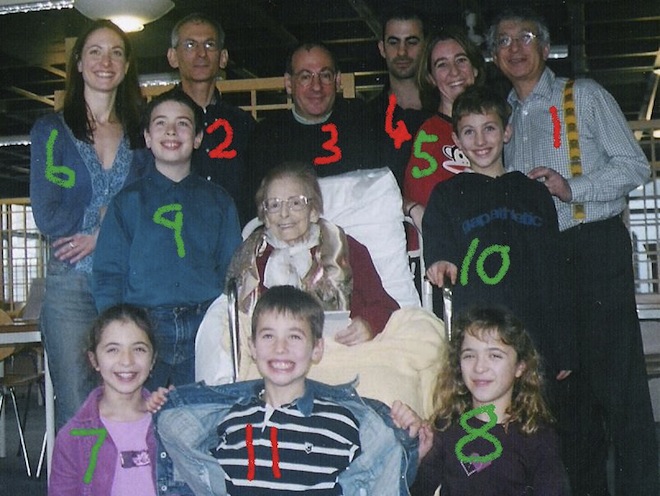 1. Son David.
2. Son Anthony (Tony).
3. Son Jeffrey.
4. Tony’s son Robin.
5. David’s daughter Kate.
6. David’s daughter Emily.
7. David’s daughter Clem (twin).
8. David’s daughter Georgia (twin).
9. Tony’s son Isaac.
10. Jeffrey’s son Joe.
11. Jeffrey’s son Mickey.
1. Son David.
2. Son Anthony (Tony).
3. Son Jeffrey.
4. Tony’s son Robin.
5. David’s daughter Kate.
6. David’s daughter Emily.
7. David’s daughter Clem (twin).
8. David’s daughter Georgia (twin).
9. Tony’s son Isaac.
10. Jeffrey’s son Joe.
11. Jeffrey’s son Mickey.
Childhood and school days
Nora was born in Hampstead (North London) on 2nd December 1914 - just four months after the outbreak of the First World War. Interviewed by her grand-daughter Emily Seymour near the end of her life, Nora had this to say about her childhood:
I had everything I needed, I had all the creature comforts, because we weren’t cold at home, in our bedroom we had a gas fire, our bathroom was quite a big room, it had a gas fire in it. We had all our comforts, we never went hungry, and we never went for any material things. But I would love to have had more cuddles and things…. I missed … But I don’t think in those days, in the kind of atmosphere that I was brought up in , in that – whatever you call it – class or what, I don’t think you did have many cuddles. Among our friends we did, you know, I had very good girlfriends, I had plenty of friends, but it would have been nice if I’d had it from my parents…..
There were several servants, including nannies, in the household.
.. You see we had a nurse and an under-nurse, and I never found that you could get really close to them….. But even the maids …. in my young days you never had a relationship – you must keep apart, and the staff, they were in the basement, they slept in the basement and they had their own living room in the basement and everything – you know, they were inferior, I suppose.
The 1921 census names the two children’s nurses in the Mayer household: Ada Jacob (aged 35, single, born in Dalston, London) and Mabel Gealey (aged 20, single, born in Carmarthenshire, South Wales).
Nora’s friends were also from well-off households.
… Any friends that we had were either from school….. But somehow you didn’t …. Unless people lived near you – you see no-one had a car, so you had to be friendly with people who lived fairly near. Or we were friendly with the children of our parents’ friends. If people didn’t live very near …. Oh we were very happy, we weren’t all that far from Hampstead Heath, every day the nanny used to walk us up to Hampstead Heath. In fact, when I was studying for my Matric, it was so difficult to find a quiet corner at home to do my studying because Henry was such a nuisance – in those days you could go up on your own to Hampstead Heath, it was quite safe, I used to take my Latin … and climb up a tree or lie on the grass with my Latin homework. When I go to Hampstead Heath now – I think about how I used to do my Latin homework. You see it was very different.
She had happy memories of South Hampstead High School, which she left at age 16.
… And in fact you see, in my days you didn’t stay on and go to university if you were a girl .. . You see after after you’d done your Matric you left. And I would have loved to stay on, I think two girls stayed on. Mind you, I don’t think my parents probably could have afforded it. But it never came in, it was never questioned that I should stay on. But I cried, the day I left school I cried, it was terrible….. Yes, well I was leaving a happy time. And it’s the unknown really, isn’t it? You don’t know how it’s going to be. But I was very very happy at school. I couldn’t really say I had any unhappy times at school, and I had lots of friends, and the sports ….
Jewish identity
Nora talked about Jewish identity in her school days.
… You see we had Jewish prayers. When you went into assembly in the morning, before you went into assembly each class …. you had two lines, to go into assembly there were two lines of girls, one was the Jewish girls and one was the non-Jewish girls. But there was no anti-semitism or anything like that. The Jewish girls had their own prayers, they would go into a different hall, and actually the Chief Rabbi in those days was called Dr Hertz and he had two daughters, Judith and Josephine, and they were both in our school. One was in my form, one in Auntie Ruth’s. The eldest one, Judith, she took the Jewish prayers. We’d take our prayers and then, after we’d had our prayers we’d wait outside the hall till they gave some signal that the Christian prayers were finished and then we’d file in in a line – each form would go in a line with a gap between for the Jewish girls to go behind. Then we had all the notices and whatever there were, and the general things that applied to everyone.
Her family were practising Jews.
Well where we lived was right opposite the synagogue. We were brought up to go to synagogue, as soon as we were old enough we went to synagogue every Saturday. In the Orthodox … you say you go with your family but … the women sit upstairs and the men sit downstairs. So if your mother wasn’t well you couldn’t go with your father because you couldn’t sit with him. But we did go, and when they started Sunday School we went to Sunday School – I think you had to be about seven. And I used to really enjoy it, I used to like the Sunday School, and in fact when we became teenagers Ruth and I and a few others, we started a Youth Club … We had quite a lot to do with the synagogue. Well first of all we lived very near, and secondly we were encouraged – more by our father than anything, to do that……Now our Grandfather [Jacob Schwarzschild] … was very very Orthodox.
Nora remembered the Jewish ceremonies very well.
And what was done – why I can still read Hebrew and things is because …..Nowadays, you know for many many years boys have been what they call Bar Mitzvah at thirteen, and girls were not done, you see. But now boys and girls are done. When I was about sixteen and Auntie Ruth seventeen they suddenly decided in our synagogue to have – they called it consecration (I’ve still got my book…), and we were both asked if we’d like to go in. These two girls who were daughters of the Chief Rabbi, they were done when we were done. But it wasn’t easy. For a whole year we had to go to classes, we had to take a Hebrew exam – I’ve got my certificate that I passed the Hebrew exam, we had to study for it. I mean I think if you’re confirmed you just … I don’t think you have to study like we had to study, we had to study Hebrew really thoroughly….. But we were brought up – which was very very good, it’s helped me all my life – we were taught all about the Jewish festivals and everything … It was partly, it was mostly my father I think, because he was quite keen that we should know.
Nora told this story about her father and the Rabbi.
Because my father was not his own boss, I told you he didn’t have a very good job, and sometimes he had to go to work on a Saturday. He didn’t like having to work on a Saturday, and one day he met the Rabbi out and he said to him ‘I’m sorry Rabbi, I must tell you that I sometimes have to go to work on Saturday’. And the Rabbi said ‘Well what of it? I have to go to work every Saturday’. And I thought that was the most lovely understanding thing to say – it was, wasn’t it? …. I thought it was rather marvellous, I even told my Rabbi about it not so long ago and he said ‘Well your Rabbi must have been a very good Rabbi.’
Secretarial training
On leaving school at age 16 Nora (like her elder sister Ruth) trained for several years to be a shorthand typist. But after one year with Ruth at the Piman’s college, Nora was offered (through a family connection) the opportunity of working at Mrs Hoster’s Secretarial Training College, with some informal teaching; this later became a free place in the college itself. As Nora said: “Nearly all the girls who went to it were from titled families, that kind of thing, and it was very expensive ….” After training, Nora got a relatively well-paid job as a legal secretary, benefitting from being a graduate of Hoster’s which was “like a Rolls Royce of colleges”. (Nora’s account of Hoster’s is verified by a 2009 obituary of Joan Bright, secretary to Churchill’s defence chief of staff during the second world war, who had also attended “Mrs Hoster’s Secretarial Training College on London’s Cromwell Road, famed for ‘turning out gels for the establishment’“. And Mrs Deborah Bean, the Queen’s Correspondence Secretary for 40 years, also trained at Hoster’s.)
The League of Health and Beauty
Ruth and I were very very involved with the League of Health and Beauty …. I think it was Ruth who heard about it first….it was a most marvellous organization …. It was started by a lady called Mrs Mary Bagot Stack. And what happened … it’s rather a sad story at the beginning. Mrs Stack was married before the First World War. She was married to a man who was in the army, and he was stationed in India. They had a child, Prunella, and when Prunella was very very young, a few months old, the war broke out (1914). Her husband was sent to Europe. Well she didn’t want to stay in India, so as soon as she could get on a boat she came back. And when she was on the boat, bathing Prunella, someone came and showed her the newspaper – her husband had been killed.
So she was left with this young baby. And she used to say – of course she was terribly anti-war – she used to say …. Ruth and I were in her top class, it was called the Specials, that’s where I spent a lot of my spare time… I must have been in my late teens and early 20s I suppose. And she used to say, if women were in power there wouldn’t be wars – she always used to say that. But she was a marvellous woman. And she decided it was terribly important for women to be healthy, you see, and she started the League. It became worldwide…. You know Davies Street in the West End? Well that’s where they had premises, I think they rented it. I used to go nearly every night in the week, and I did tap-dancing and the exercises. Then later I taught. It was a wonderful atmosphere, wonderful friendly kind of atmosphere.
Mary Bagot Stack started the League in 1931. Her daughter Prunella Stack (1914 - 2010) married Lord Douglas-Hamilton in 1938; her husband joined the RAF and was killed over France in 1944.
Nora (aged 19) doing ‘seal’ on the rocks at Ilfracombe, Devon, August 1934.
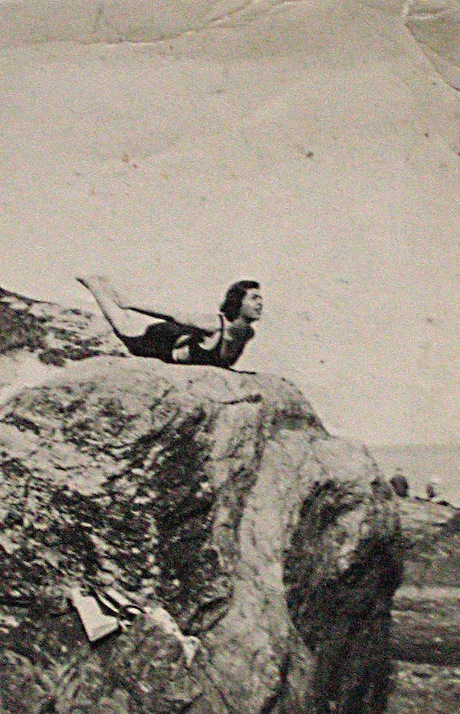
Every year they had a display in Hyde Park and at the Albert Hall. My father was terribly proud because Ruth and I were on the news … We never knew how it came about, but when Prunella married the first time - she married Lord David Douglas-Hamilton who was from Scotland, and when they got married, out of all the hundreds – thousands in the League, sixteen were chosen to be in the guard of honour at the wedding in Glasgow Cathedral, and Ruth and I were chosen to be in the sixteen, we had our fare paid to Glasgow. It was on the newsreel at the cinema, my father took us to the cinema so we could see ourselves.
But once a year we had this demonstration in Hyde Park and at the Albert Hall. And you used to assemble somewhere – oh yes, near the BBC there’s a church, well we used to go to that church and have a service and we all had to wear our uniform. Then we used to march through the West End – they used to stop the traffic - and we had banners. We were in Mrs Stack’s Specials. We marched to Hyde Park and we demonstrated in the park, and then we used to go to the Albert Hall ….
But it was very exciting really, the performance, because you had people – they all came in with their banners, and they came from all over England. That drew people together. It kept you healthy, and I found it very stimulating, the classes, and they were very nice .. on the whole very nice people: all sorts, and of course they were all very interesting. You didn’t join to slim, it wasn’t like a slimming club – you joined like people go to the gym now.
The Brady Club
You know I’ve always liked to help people if I can … Well there was a club in the East End called Brady – I think there’s a street called Brady Street – and there was a club for poor girls. Well they paid a penny a week to join. Of course a penny then was different. But most of them hadn’t got bathrooms at home, and I think they used to pay a penny and we used to give them a towel and they could have a bath. I said I’d like to do something and somebody suggested I went there. So after the office I would go there, and then later Ruth came as well. Then I used to go to their committee meetings, they put me on the committee …
And then one time – one meeting I was at, and they said ‘Oh they’ve been asking … we’d like to give them some kind of PT lessons’, so I said ‘Well I might be able to do League of Health and Beauty’. Of course they went mad! I said ‘I’d have to get permission from Prunella Stack.’ (Her mother had died by then, she got cancer and died, fairly young.) I wasn’t a trained teacher. So I went and spoke to Prunella and she gave me permission to teach. And it was marvellous because I wasn’t very old, I hadn’t even met George. And it was so funny, I had women of all ages and they used to come and ask me: ‘Well I’ve got this and this wrong with me, is it all right, Miss, if I do this or do that?’ They absolutely loved it - I got Auntie Ruth to come and help me afterwards.
And we had a piano in the classroom and I couldn’t do that but I got them to let me have a radio, and then I had to stop the music, you see, we did it to music. And it was very exciting because one day they came to me and said, it was an open day and they wanted to put a display on. Can you imagine? I had to put a display on, and I mean some of them were quite elderly these people. And I wanted them … you know in the League we wore uniform, it was black satin tights and a white sleeveless blouse. And they were all terribly poor. So by that time I was already doing a bit of dress-making, and so I got them to bring old coats and I cut up the linings, and do you know I got them all in uniform? It was such a success, I can’t tell you. And the husbands were coming up to me and thanking me – most of them were much older than me that I was teaching.
The Brady Club was in Hanbury Street, next to the Brady Street cemetery in the Jewish East End of London.
The Maccabi Club
In December 1937 Nora wrote to her cousin Ruthie.
…Ruth and I went to a dance at Maccabi House. I expect you have heard of Maccabi, well, they have just had a super new Club House in Compayne Gardens redecorated and modernised throughout. It really is lovely. Anyway last week was the opening week and to finish off with they had a dance on Saturday. Before the dancing there were several speeches, and who do you think gave the first one, I don’t think you will guess, well it was Prunella [Stack]. You can imagine that she must have felt a bit shy as everybody else there was Jewish, and when Ruth and I went up to her I really thought for a moment that she was going to kiss us she was so pleased to see somebody she knew. Anyway, of course, as usual she gave a perfectly marvellous speech, and it was most amusing how all the men fell for her, and the women as well…
Nora’s address at this time was 23 Broadhurst Gardens, West Hampstead - the next street to the Maccabi Club in Compayne Gardens. The Maccabi Association London has since been merged with the Brady club in the East End of London as Maccabi London Brady.
After Alfred Mayer’s Death, 1935
When Nora’s father died, she and Ruth were working and contributed to their mother’s housekeeping.
First of all, she took in … it was kind of lodgers …. She took in girls from Nazi Germany, they weren’t exactly on the Kinder Transport, but they were refugees, if they’d stayed in Germany, they would probably have gone to a death camp. I believe their parents did….. They were like paying guests. I think, they didn’t pay a lot of money, but they paid enough. It helped my mother a little bit. They were paid for by some refugee committee … I think we used to have one at a time….
But she went to live, and we all had to go with her, to a hotel in Bayswater…. We didn’t resent having to, well, we just had to go. My mother closed the house down, but it was rather sad, because a lot of the furniture and stuff, but at least we were all together…. Ruth and I had to pay our own, so we cost my mother nothing, we had to pay our own fares and clothes and everything…. We just took it for granted. We hadn’t got a father, we had to pay for ourselves. I wasn’t resentful or anything about it, it wasn’t always easy, but actually we weren’t unhappy there…
One point I remember very clearly, it was Mr Chamberlain who was Prime Minister … and when he went to Germany to see Hitler, and came to terms to agree with him over something, because really, we were prepared for a war, and when we went down to breakfast, because in this hotel you got breakfast, and we said something about it, and there was a couple there, I can see them now, middle aged couple from Germany, they were refugees, and he came over and apologised in the evening, because when I said ‘have you heard …‘, he said ‘Mr Chamberlain wouldn’t deal with that swine, he wouldn’t deal with Hitler’, he just couldn’t believe it.
When the war broke out in 1939 Nora’s mother decided to leave London, and went to live in Worthing, Sussex, on the south coast. Ruth and Nora moved to a rented room.
But we were terribly lucky. I believe Auntie Ruth found it, we had this room in Queens Gate, and you know what lovely houses they are, it was so funny – I think we paid 30 shillings a week each, and it was quite a nice big room and you had an electric kettle…. But for your money you got – I think they cleaned the room and that – you got breakfast. But it was very posh: if anyone came to visit us, they rang the bell and a man in a white coat came and opened the door. And you got a very good breakfast …We’d ring down and say we’ll be down at 8 o’clock for breakfast, and they’d ask you what you wanted and it would all be on the hot-plate waiting, we were waited on for breakfast, it was very good…. What happened was, the couple who owned it, a very nice youngish couple but they didn’t have any idea about business, they were much too generous. Every Saturday we used to go down and pay our bill and they used to give us a sherry and stay talking to us and all that … So I think the place almost went bankrupt, I think they closed it down in the end….. Well we had to leave, and we went to another place which wasn’t nearly so posh but it was in that kind of area, it was more Bayswater – that had been Kensington. And we were quite happy, we had one room there…. But later … I can’t remember exactly how it came about but the place in Queens Gate opened again and we went back, and I got married from Queens Gate.
George
Nora met George on 31st October 1939, shortly after the start of the second world war. Their meeting followed a party at the house of George and Raichka at 36 Leinster Gardens, which is a 20-minute walk through Kensington Gardens from Ruth and Nora’s room at 198 Queens Gate. They married in June 1940; as Nora said:
He didn’t want to wait because he knew he would get his call-up papers any time. Six days after we married he got his call-up papers….. Oh he proposed in a very funny way! You know what he was like …. a very funny way – he didn’t really propose.. He said ‘Do you know what I did today?’ I said ‘No – anything special?’ And he said ‘I went to Caxton Hall and put our names down for getting married’. That’s how he told me!
But then I was a bit worried about my mother, because Caxton Hall was a registry office and I thought that my mother would have liked a religious ceremony, you see. And I really would have have liked to get married in a synagogue. But it was so difficult to arrange things then … I rang my mother up and told her on the phone, and she said it was all right. And then, not many days later, she rang me up and she said ‘I’ve been thinking about it ..’ - I’m so, so grateful to her about this – she said ‘Daddy wouldn’t have liked you not to get married in a synagogue…. Go to the New West End synagogue …’ She told me the name of the rabbi. ‘Go and see him’, she said – I think he married my parents or something, he knew them anyway. ‘I’m sure he’ll marry you’. So I rang up and made an appointment, and we both went along and he was terribly nice…. So the rabbi said ‘Go and get married at Caxton Hall because you’ve got that … and then come here for a blessing’. So we agreed to that. And then he said ‘Get married on the Friday at Caxton Hall and then come here on the Sunday’. Because, you know, you wouldn’t have a wedding on a Saturday in a synagogue. So that picture there - Grandpa with his umbrella – that was outside Caxton Hall. And you must admit, not many people have such a romantic meeting … and I don’t regret any of it.
Wedding day, 28th June 1940, and George and Nora in the early days of their marriage.
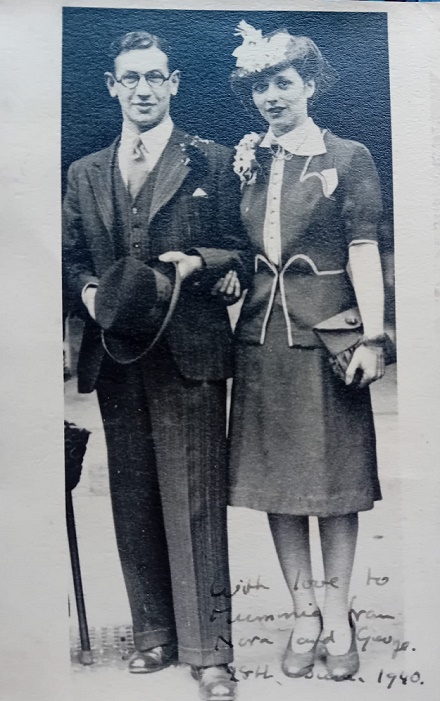
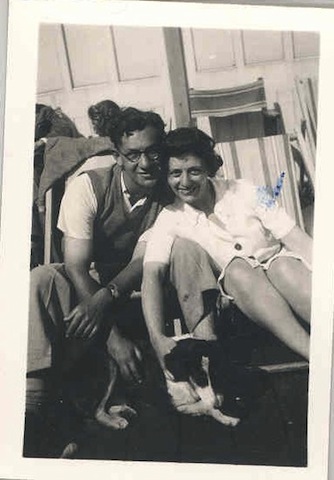
Nora’s grandfather Jacob Schwarzschild had for many years played an important role in the New West End synagogue.
While Nora was pregnant with her first child, she had an interesting encounter with the Rabbi.
But about the food business, we had Kosher roast beef on a Sunday, but we never had ham or pork in the house, my parents never did. But when I was expecting David, the Rabbi had heard that I was pregnant …. and he came to see me one day. I couldn’t understand why he came to see me. And he said ‘I understand you’re pregnant’, I said yes, and he said ‘Well I’m giving you permission to eat ham and pork, because the baby must have all the nourishment it can get’. I was on rations of course, and you’re getting much less in vitamins than you should. And mind you the first ham sandwich that I ate, I realized what I’d missed! I really enjoyed it! But what right a Rabbi has to give you permission I don’t know. I have told several people, I’ve never met anyone else before – and that was an Orthodox Rabbi, you see they are human.
Nora at home in the Stanmore flat, 1998, and on a visit to the Bevis Marks synagogue, London
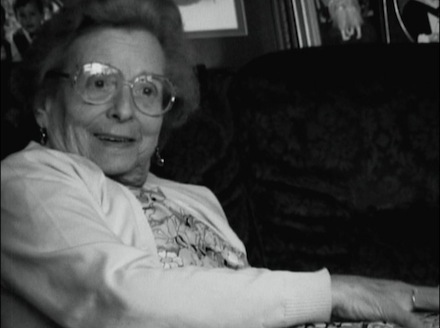
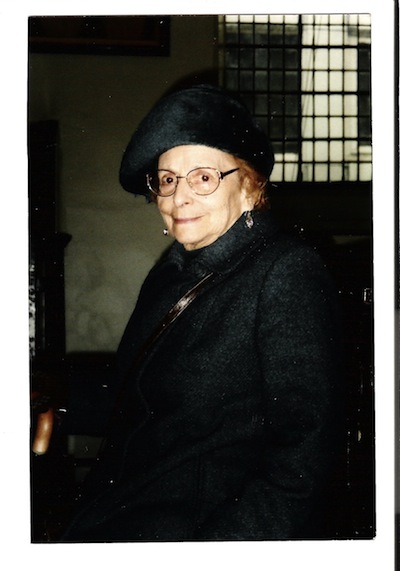
Page last updated 27 Aug 2025.